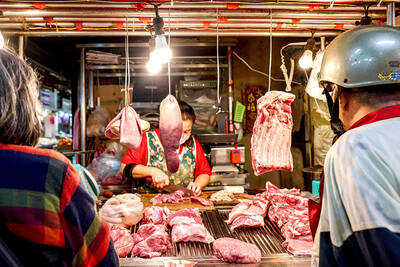Every Lunar New Year, Longshan Temple is always packed like a can of sardines. Devout believers take numbers and line up until late at night, waiting to “pacify Taisui.” But exactly who is Taisui? And why do people want to pacify Taisui? How do you complete the ritual?
Chinese custom keeps track of the years by using combinations of the ten heavenly stems and the twelve earthly branches to create a 60-year cycle. It takes 60 years to complete a cycle from the first combination to the last. Every year one of 60 heavenly gods is given responsibility to watch over the world. Taisui is the title of the god who's constellation is designated as monarch for that year. For example, this year is the pig year of the fourth heavenly stem and the twelfth earthly branch; the constellation in charge of this year is General Feng-chi (the sixty constellation names are taken from the gods described in the novel The Creation of the Gods ).
Furthermore, since ancient times, these twelve earthly branches have been grouped with the twelve animals. Therefore, the first branch is associated with the mouse, the eleventh with the dog and the last branch with the pig. Given this system, and according to the Chinese traditional thinking of avoidance, people born in the year of the pig (this year, the year of the fourth heavenly stem and the twelfth earthly branch) run afoul of the Taisui for the year of the pig. Last year was the year of the fourth heavenly stem and the eleventh earthly branch, a year of the dog, so those born in the year of the dog are in direct opposition with Taisui. It is generally considered inauspicious to be in opposition to that year's Taisui, so he must be pacified to encourage good luck and avoid bad luck.
The traditional method of pacifying Taisui is not only complicated but highly varied. The general method is to write one's exact time of birth (defined using the 60-year cycle) and one's name on a piece of golden paper, offer it to Taisui and then offer tea or fruit as a sacrifice to him while reciting scripture. This must be done at least on the 15th day of every lunar month. On the 24th day of the 12th lunar month, tea and fruit are offered in thanks to Taisui as a ceremonial parting gift.
Nowadays the system for pacifying Taisui has changed with the times. You can pay money to ask someone at the temple to help you complete the required rituals. Not only that, but if you lack the time to visit the temple or are unwilling to pay, there are free web sites to help you complete the ritual, which is both convenient and cheap.
(translated by Jason Cox)
每逢過年,龍山寺總會被擠得水洩不通,虔誠的善男信女漏夜排隊領號碼牌,等著「安太歲」。到底太歲是誰?為什麼要安太歲?傳統的習俗為何呢?
根據中國十天干與十二地支相配而成六十年的甲子計年法,從甲子到癸亥,每六十年為一週期,每年都有一位負責看守人間的星君,共六十位,所謂太歲君就是輪到今年值守的星宿,以今年豬年丁亥年為例,值守的太歲君就是封齊大將軍〈這六十位星宿的名字乃是後人依封神演義裡的角色命名〉。
而自古十二地支便會與十二生肖搭配,所以子就是鼠;戌就是狗;亥就是豬,以此類推,而根據中國傳統趨避沖犯的思維,今年丁亥年就和屬豬的人相沖,屬狗的人在去年丙戌年也和太歲君相沖,凡相沖均被視為不吉,所以需要安太歲以趨吉避凶。
傳統安太歲的方式不僅繁複且無定則,大致上得
將自己的生辰八字和姓名寫在金紙上,供奉於神明位
,再以清茶水果等祭物祭拜,搭配念經,至少每逢十五都得祭神,最後於農曆十二月二十四日,以清茶水果舉行拜謝太歲君的送神儀式。
如今安太歲的儀式因時制宜,不僅能花錢請廟祝代勞,沒空到寺廟,或是不願意花錢的民眾,還可以透過免費網站,依照指示完成儀式,省錢又方便。
(鄭湘儀編撰)

Pigs that are resistant to a deadly viral disease have been created by scientists at Edinburgh’s Roslin Institute. The gene-edited animals remained healthy when exposed to classical swine fever (CSF), a highly contagious and often fatal disease. The virus was eradicated in the UK in 1966, but there have been several outbreaks since and it continues to pose a major threat to pig farming worldwide. “Classical swine fever is a devastating disease for livestock and farmers as we saw with the outbreak in the UK, 25 years ago,” said Helen Crooke, mammalian virology deputy leader at the Animal and Plant Health Agency

Have you ever seen a circular intersection where cars continuously flow in one direction around a central island? That is a “roundabout,” a well-known alternative to traditional intersections. Drivers enter and exit at different points without relying on traffic lights. Their primary purpose is to improve traffic flow and minimize the likelihood of high-speed collisions, particularly dangerous T-bone and head-on crashes. Roundabouts have existed and been implemented for over a century. In the 1960s, the modern roundabout emerged in the UK, with added rules for yielding. Unlike intersections with red lights, roundabouts allow vehicles to continue moving at a

對話 Dialogue 清清:明天我想請一天假。 Qīngqing: Míngtiān wǒ xiǎng qǐng yì tiān jià. 華華:為什麼?這個月的假已經很多了,你還要請假啊? Huáhua: Wèishénme? Zhège yuè de jià yǐjīng hěn duō le, nǐ háiyào qǐngjià a? 清清:因為明天是農曆九月初九重陽節,重陽節是老人節,我想陪我阿公阿嬤去爬山,而且家裡也要拜祖先,請假比較方便。 Qīngqing: Yīnwèi míngtiān shì nónglì jiǔ yuè chū jiǔ Chóngyáng Jié, Chóngyáng Jié shì Lǎorén Jié, wǒ xiǎng péi wǒ āgōng āma qù páshān, érqiě jiālǐ yě yào bài zǔxiān, qǐng jià bǐjiào fāngbiàn. 華華:了解,是應該陪老人出去走走。阿公阿嬤應該會拿到政府發的紅包吧? Huáhua: Liǎojiě, shì yīnggāi péi lǎorén chūqù zǒuzǒu. Āgōng āma yīnggāi huì nádào zhèngfǔ fā de hóngbāo ba? 清清:有啊!65歲以上的長輩都會領到敬老金,只是每個縣市給的數字不太一樣,年紀越大,拿到的會越多喔! Qīngqing: Yǒu a! Liùshíwǔ suì yǐshàng de zhǎngbèi dōu huì lǐngdào jìnglǎojīn, zhǐshì měi gè xiànshì gěi de shùzì bútài yíyàng, érqiě niánjì yuè dà, ná dào de huì

A: So you’re reading Jin Yong’s martial arts novel again? B: Yup, Jin’s novels are so fascinating, especially the trilogy: “Legends of the Condor Heroes,” “Return of the Condor Heroes,” and “Heaven Sword and Dragon Saber.” A: The late novelist published his first story in 1955, which means this year marks the 70th anniversary of his “wuxia” world. B: Wasn’t an English version of “Legends of the Condor Heroes” also released in 2018? A: Yes, but the debate over the translation of kung fu moves continues — like the evil move “Nine Yin Skeleton Claw.” A: 你又在重讀金庸的武俠小說啦? B: